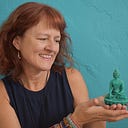Grief and Gratitude
Mom died three years ago, in August 2019, yet there’s not a day that I don’t think about and miss her.
Lately, I’ve been temporarily forgetting that she’s gone and having the urge to call her.
She and I were big Gator football fans. Recently, my daughter and I were walking around Disney with my daughter wearing Gator garb, and people kept saying, “Go Gators!” Mom would love that, I’d think. I should tell her. Then I’d remember.
Mom was in the room when my daughter was born. It wasn’t really planned. My daughter was born early. I’d been sent home from the hospital, told that I wasn’t about to give birth, to show up for my regularly scheduled appointment the next week. I called Mom from the hospital parking lot, explaining I’d been given a sedative so strong that they hadn’t even let me walk to the car, that I’d had to use a wheelchair. Yet, a few hours later, there was no denying I was in labor. I called Mom to tell her that her granddaughter was arriving, only to discover she was already driving my way. She just knew. We were that connected.
That also connected her to my daughter, her namesake. Lately, I keep wanting to call her to let her know how well my daughter is doing, how proud I am of her. Then I remember.
In this latest season of The Crown, Philip, the Duke of Edinburgh, comforts a mother who has lost her five-year-old daughter to cancer. He explains that he lost his favorite sister in an airplane crash. He says, “I learned then what grief was. True grief. How it moves through the body. How it inhabits it. How it becomes part of your skin. Your cells. And it makes a home there. A permanent home. But you learn to live with it.” He then assures this newly-grieving mother that she will be happy again.
I’m not unhappy, not weighed down by grief. Rather, I am grateful because not just grief but my mother inhabits my cells.
In his book, The Sun My Heart, Thich Nhat Hanh describes a poet friend who left home and would not see his mother again for 40 years. When his friend was leaving home, his mother told him that if he missed her to look at his hands.
When I look in a mirror, I see my mom. She is in my eyes, my hair, my hands. I’d like to call her, talk to her again, but she is still here with me.
As we approach Thanksgiving, one thing for which I am truly and eternally thankful is to have had a mother who knew me so well, who loved me unconditionally. I am thankful that, because of her, there was never a day in my life when I felt unloved.
To miss her is a blessing, for to miss her means that I experienced the kind of love that we all deserve.
And I am grateful that, though I miss her, I know she is also still here with me.
